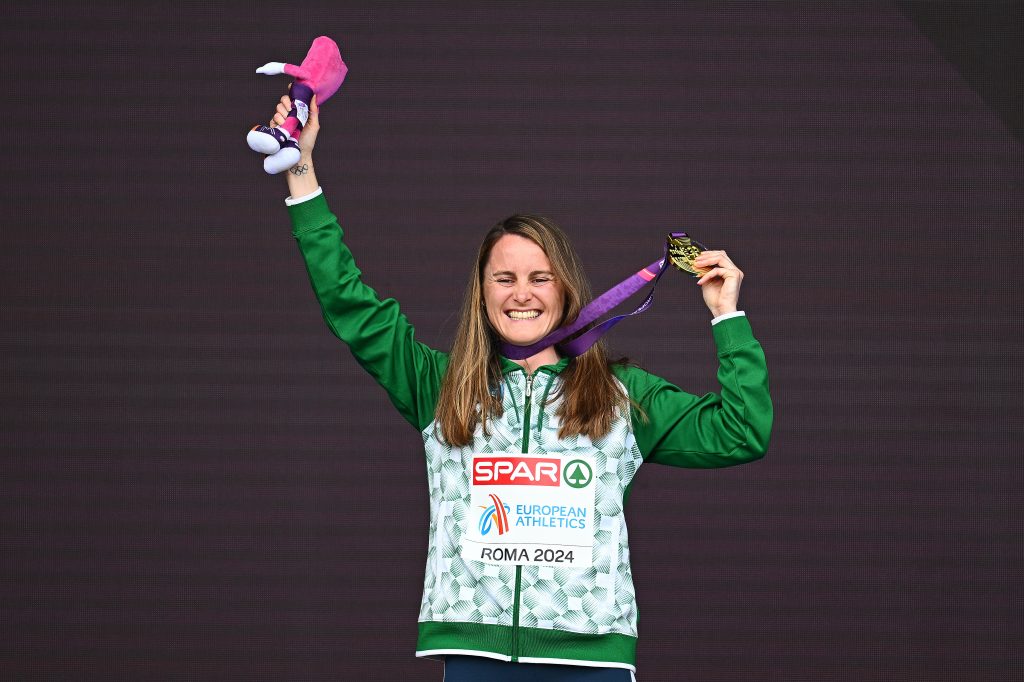Coping With an Unexpected Cancer Diagnosis
- Olympic distance runner Ciara Mageean, 33, revealed she’s been diagnosed with cancer. While she hasn’t shared details about the type, she acknowledged the emotional weight of the diagnosis.
- Coping with a serious diagnosis can be mentally taxing. Strategies like leaning on loved ones, journaling, or speaking with a mental health professional can help support emotional well-being.
- Everyone processes a diagnosis differently—some choose to share openly, while others prefer privacy. According to SurvivorNet experts, there’s no “right” way to cope; all approaches are valid.
- Building a support network is often crucial for navigating a cancer journey, as these individuals can help you get through challenging treatment days or assist with everyday tasks. This can include family, friends, therapists, or even online communities that offer encouragement and connection.
“It’s been a lot to take in, but I’ve already started treatment, and I’m incredibly grateful to be surrounded by the love and support of my family and close friends,” Mageean wrote in an Instagram post.

“I’m ready to face this with the same fight I’ve always brought to the track,” the European champion added.

Mageean, a native of Ireland, has earned gold, silver, and bronze medals at the European Championships. She represented her country at the 2016 Rio Olympics and again at the 2021 Tokyo Games, which were postponed due to the COVID-19 pandemic. She had been preparing for a return to the Olympic stage in Paris, but an Achilles injury sidelined her last year.
Now, she faces a different kind of race—one that will require all the resilience she’s shown throughout her career.
Fans and fellow athletes quickly flooded Mageean’s social media with messages of encouragement. Among them was marathoner and podcast host Ali Feller, who is also battling stage 4 breast cancer (also called metastatic breast cancer because the cancer has spread beyond the breast).
“An army of love and support with you and behind you. Lean in, lean on, and know you’re not alone in any of this,” Feller commented.
Feller, who recently shared that her cancer had spread to her bones, offered a message of solidarity from someone who understands the road ahead.
Mageean’s announcement is a powerful reminder that even the strongest among us face unexpected challenges. But with her trademark tenacity and a community rallying behind her, she’s stepping into this fight with courage and heart.
Helping You Manage Your Mental Health
Help Coping With a Cancer Diagnosis
If you are facing a cancer diagnosis, your emotions are likely to run high, which is completely normal. Psychiatrist Dr. Lori Plutchik says emotions are often fluid when coping with a diagnosis.
“The patient or person going through the stressful event should accept that emotions will be fluid. You may feel fine one day and then feel a massive wave of stress the next. It’s also important for those you look to for support, whether that’s a therapist, friends, family, or both, to understand the fluidity of stress-related emotions,” Dr. Plutchik said.
WATCH: How to cope with complex and changing emotions.
If a stressful event affects how you think and feel, it may be time to seek mental health treatment. This could involve traditional talk therapy, medication, modifying lifestyle habits (such as exercise and diet), joining a support group, or exploring other approaches.
SurvivorNet experts suggest that women need a little extra help coping with a breast cancer diagnosis.
- Let your family and close friends know, and let them help. So many cancer survivors tell us they want and need support but are often too preoccupied to make specific requests. Urge those close to you to jump in with whatever practical help they can offer.
- Keep a journal. It can be extremely cathartic to let those feelings loose on paper. Grab a pen and a nice journal and chronicle your thoughts throughout the day.
- Join a cancer support group. Groups in nearly every community offer opportunities to connect with others going through a similar journey. You’ll learn constructive insight from others who can tell you what to expect and how to stay strong on tough days.
- Consider seeing a therapist. Ask your doctor to refer you to a therapist so you can discuss your fears and concerns in a safe space. Often, vocalizing your thoughts and feelings rather than internalizing them can provide relief.
- It’s Okay to Keep Some Things Private
Mageean hopes concerned fans give her the space she needs to not just treat her cancer but also mentally process this life-changing moment. Some people battling a disease or cancer are open to sharing their experiences as much as they can, while others prefer to keep it to themselves or close loved ones. SurvivorNet experts say both approaches and everything in between are valid.
“Patients who have just been diagnosed with cancer sometimes wonder how they are going to handle the diagnosis of the cancer in social situations,” Dr. Plutchik explains.
Plutchik says patients consider questions like “How much information should they share and with whom should they share the information?”
Dr. Plutchik explains, “There is no one right way to handle this diagnosis. People should do what feels right to them.”
WATCH: Sharing your diagnosis.
A cancer journey can last months to years, which means cancer warriors may be experiencing a lot of uncertainty until they fully understand where their health stands. This uncertainty can influence when a cancer patient is ready to share their diagnosis, Dr. Plutchik further explained.
Dr. Plutchik stresses that those close to a person going through cancer should be respectful of their wishes when it comes to disclosing their diagnosis and seeking support.
Finding Your Base of Support
Many cancer patients are encouraged to build a community of supporters to help them along their cancer journey. The support group can be comprised of close family and friends. It may also involve a mental health professional or online support groups available on social media. Every survivor SurvivorNet has had the opportunity to speak with and detail their own way of coping, whether it’s exercise, advocacy, or meditation.
Ovarian cancer survivor Kelly Sargent found a sisterhood of supporters among women she met at a Bible study group, which eventually became an essential part of her support network.
WATCH: The Benefit of Support Networks for Cancer Patients.
“When I was diagnosed, as soon as I got in the hospital, I started going online to find not only information, but also support groups, stories from survivors, anything that I could find as far as my treatment, I definitely looked for,” Sargent told SurvivorNet.
“I have an incredible set of friends that I met after my diagnosis through a Bible study group that have become very, very close friends of mine that are an incredible part of my support system. That support from those ladies has been life-changing for me,” Sargent continued.
Learn more about SurvivorNet's rigorous medical review process.

